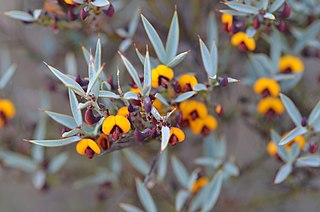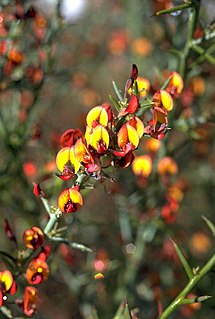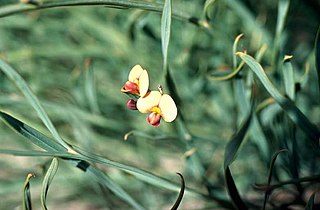
Daviesia horrida, commonly known as prickly bitter-pea, is a species of flowering plant in the family Fabaceae and is endemic to the south-west of Western Australia. It is a spreading shrub with rigid, spiny branchlets, narrowly elliptic phyllodes and orange and dark red flowers.

Daviesia triflora is a species of flowering plant in the family Fabaceae and is endemic to South West Australia. It is a rush-like, leafless shrub with many stems, and orange-yellow and dark flowers.

Grevillea hakeoides is a species of flowering plant in the family Proteaceae and is endemic to the south-west of Western Australia. It is a spreading shrub with flat, linear or more or less-cylindrical leaves and dome-shaped groups of flowers, the colour varying according to subspecies.

Daviesia divaricata, commonly known as marno, is a species of flowering plant in the family Fabaceae and is endemic to the south-west of Western Australia. It is a low, spreading or erect and bushy shrub with phyllodes reduced to small, triangular scales, and orange and maroon flowers.

Daviesia nudiflora is a species of flowering plant in the family Fabaceae and is endemic to the south-west of Western Australia. It is a bushy shrub with sharply pointed, egg-shaped to elliptic or oblong phyllodes, and yellow-orange flowers with reddish-brown markings.
Daviesia benthamii is a species of flowering plant in the family Fabaceae and is endemic to the west of Western Australia. It is an erect, bushy shrub with scattered, cylindrical, sharply pointed phyllodes, and yellow-orange and reddish-brown flowers.

Daviesia brachyphylla is a species of flowering plant in the family Fabaceae and is endemic to the south-west of Western Australia. It is a spreading to bushy shrub with cylindrical phyllodes with a slightly downcurved point and orange, maroon and red flowers.

Daviesia debilior is a species of flowering plant in the family Fabaceae and is endemic to the south-west of Western Australia. It is a shrub with low-lying stems and many erect branchlets, scattered linear to scale-like phyllodes, and yellow, purplish, orange-pink and dark purplish flowers.

Daviesia decurrens, commonly known as prickly bitter-pea, is a species of flowering plant in the family Fabaceae and is endemic to the south-west of Western Australia. It is spreading, erect, or low-lying shrub with scattered, sharply-pointed, narrow triangular phyllodes, and yellowish pink and velvety red flowers.

Daviesia elongata is a species of flowering plant in the family Fabaceae and is endemic to the south-west of Western Australia. It is a glabrous, spreading or sprawling shrub with narrowly egg-shaped to linear phyllodes and yellow-orange and maroon flowers.

Daviesia emarginata is a species of flowering plant in the family Fabaceae and is endemic to the south-west of Western Australia. It is an erect, mostly glabrous shrub with scattered egg-shaped phyllodes with the narrower end towards the base and with a notch at the tip, and yellow and pink flowers.

Daviesia implexa is a species of flowering plant in the family Fabaceae and is endemic to the south-west of Western Australia. It is a mound-shaped shrub with many tangled stems, scattered linear phyllodes and yellow or apricot-coloured, reddish-brown and yellowish-green flowers.

Daviesia incrassata is a species of flowering plant in the family Fabaceae and is endemic to the south-west of Western Australia. It is an erect, mounded to spreading shrub with more or less zigzag branchlets, scattered needle-shaped phyllodes and orange, deep red and pink flowers.

Daviesia intricata is a species of flowering plant in the family Fabaceae and is endemic to the south-west of Western Australia. It is a glabrous shrub with densely tangled branches, sharply-pointed, needle-shaped or flattened phyllodes and apricot-yellow and dark red flowers.
Daviesia pachyloma is a species of flowering plant in the family Fabaceae and is endemic to the south-west of Western Australia. It is an erect, bushy or spreading shrub with zigzagging branches, sharply-pointed, narrowly elliptic to linear phyllodes, and yellow and red flowers.

Daviesia rhombifolia is a species of flowering plant in the family Fabaceae and is endemic to the south-west of Western Australia. It is a bushy, spreading shrub with scattered, rhombus-shaped, sharply-pointed phyllodes, and orange and dark red flowers.

Daviesia sarissa is a species of flowering plant in the family Fabaceae and is endemic to inland areas of south-western Western Australia. It is a spreading or sprawling, glaucous shrub with scattered, long, rigid, cylindrical, sharply-pointed phyllodes, and orange-yellow and red flowers.

Daviesia spinosissima is a species of flowering plant in the family Fabaceae and is endemic to the south of Western Australia. It is a shrub with crowded, rigid, sharply-pointed, narrowly triangular phyllodes, and yellow and red flowers.

Daviesia trigonophylla is a species of flowering plant in the family Fabaceae and is endemic to the south of Western Australia. It is an erect, bushy shrub with elliptic or egg-shaped phyllodes that are triangular in cross-section, and orange, dark red and maroon flowers.

Daviesia uncinata is a species of flowering plant in the family Fabaceae and is endemic to the south-west of Western Australia. It is a densely-branched shrub with many stems, hooked, needle-shaped, sharply pointed phyllodes continuous with the branchlets and rich yellow and pinkish-red flowers.


















